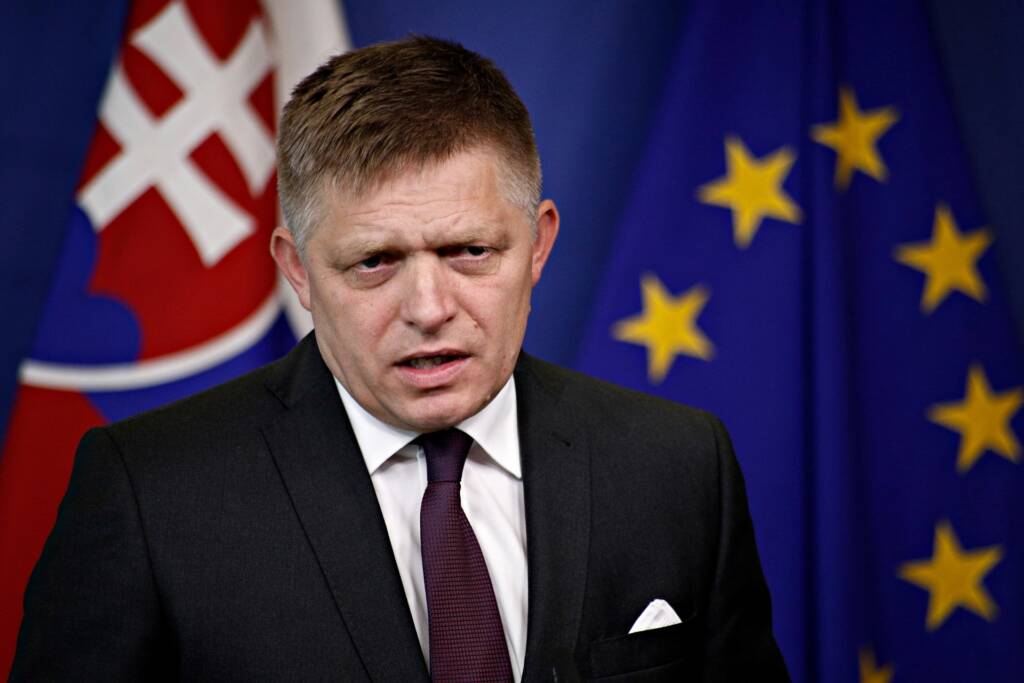Robert Fico is a honey badger. He doesn’t fear a thing. And he just jackhammered the EU’s favorite office in his country.
On March 20th, Slovakia’s government took the significant step of dissolving its special prosecutor’s office, an action perceived by European Union officials in Brussels as a contravention of the principle of the rule of law. This move has drawn criticism, especially from those who oppose the government’s stance on sovereignty, peace negotiations, and immigration policies. Robert Fico, Slovakia’s Prime Minister, who secured his position for the fourth time in October, has notably diverged from the Western liberal consensus in Europe by aligning with positions similar to those of Hungary’s Prime Minister Viktor Orbán. Fico has publicly criticized initiatives for pro-migration, European Union federalization, the promotion of transgender rights, the culture of ‘wokeness,’ and the imposition of sanctions against Russia. Instead, he advocates for peace talks to resolve the ongoing conflict in Ukraine.
Join us on Telegram: https://t.me/tfiglobal
Such statements and policies have caused discontent in Brussels, culminating in the European Parliament’s January resolution. This resolution condemned Slovakia’s nationalist government for amendments to the nation’s criminal code, notably the abolition of the special prosecutor’s office.
The dissolution of Slovakia’s special prosecutor’s office has sparked a complex debate, underpinned by accusations of political bias and misuse. Robert Fico, along with his supporters, argues that the office, under the leadership of Daniel Lipšic, his political adversary and the former justice minister, was exploited by the previous administration as a tool to suppress political opponents. Katarína Roth Neveďalová, a Member of the European Parliament from the ruling Smer party, echoed this sentiment in a recent media interview.
Read More: Robert Fico’s Message to NATO is LOUD and CLEAR
She recounted how, during Smer’s time in opposition, there were overt threats from the then-government to target opposition leaders, leading to multiple prosecutions that ultimately resulted in acquittals.
The European Union, once commendatory of Slovakia’s special prosecutor’s office for rule of law adherence, now critiques its dissolution and Slovakia’s criminal law revisions, as expressed in a European Commission letter. These changes threaten EU law and financial interests, potentially triggering ‘rule-of-law’ procedures and fund freezing, reflecting a broader EU stance seen with Hungary and Poland. This places Slovakia at a pivotal point, reconciling national reforms with EU expectations.
Despite controversies, including the special prosecutor’s office dissolution, the EU, through a diplomat’s words to Reuters, indicates no immediate punitive steps against Slovakia. This leniency stems from Slovakia’s non-problematic foreign affairs stance, notably on Ukraine, and Prime Minister Fico’s criticism of EU policies without hindering key European Council decisions on Ukraine, thus softening concerns about Slovakia’s foreign policy.
However, internal policies, particularly the reform of public broadcasting, have ignited further debate. The Slovak government’s decision to overhaul the national radio and television broadcaster, including the introduction of a new organization and leadership, has drawn criticism. Culture Minister Martina Šimkovičová defends these changes, arguing that the current broadcaster’s bias towards mainstream views and its censorship of alternative perspectives necessitate reform. This move has irked liberals both within Slovakia and across the EU, contrasting starkly with the EU’s more sympathetic engagement with Poland’s new leftist-centrist government, despite its similar aggressive approach to national media. This dichotomy highlights the complex interplay of political, cultural, and media-related reforms within EU member states and the varied responses these actions elicit from the European Union itself.
Read More: Slovakia vs. EU: Fico’s Explosive Rule of Law Clash!
In Slovakia, the political landscape is marked by escalating tensions and public demonstrations against Prime Minister Robert Fico’s government, with a significant protest occurring last Friday. Adding to the complexity, President Zuzana Čaputová, a vocal critic of Fico, has decided not to seek re-election in the upcoming presidential race scheduled for this Saturday. Although the presidency is largely symbolic, it has become a battleground for ideological clashes between anti-globalist sentiments and pro-European Union conformity.
The election is closely contested between two principal candidates: Peter Pellegrini, a former prime minister and ally of Fico, and Ivan Korčok, the liberal foreign minister in the preceding administration known for his critical stance on Hungary. Opinion polls suggest a tight race between Pellegrini and Korčok, with forecasts indicating a neck-and-neck competition for both the initial and potential second rounds of voting. This election is a critical moment for Slovakia, highlighting the nation’s divided political and social landscape.
